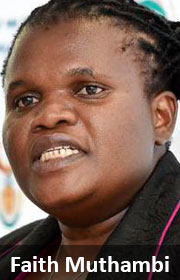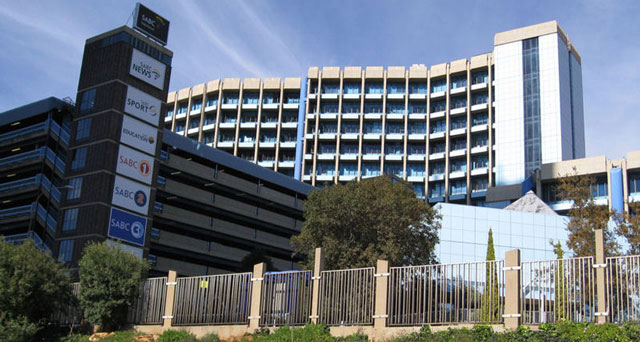 Government is committed to develop a relevant public broadcaster. It seems that some people have already forgotten that pre-1994, the broadcasting system was characterised by inequality of access, language, cultural and education programming, lack of diversity and choice in services.
Government is committed to develop a relevant public broadcaster. It seems that some people have already forgotten that pre-1994, the broadcasting system was characterised by inequality of access, language, cultural and education programming, lack of diversity and choice in services.
Again, it seems that there are some people who have not yet realised that since our democratically elected government took over in 1994, it has never failed to allow the truth to breathe — and hence, as South Africans, we are now living in a world that is unrecognisable from that of 21 years ago.
We do not want to bring back the bitter memories of apartheid. Rather, the truth must be told that before the dawn of democracy, the apartheid regime was characterised by a culture of secrecy, disinformation and restrictions on press freedom.
Those who were there during the late 1980s will remember that news at SABC was always permeated with racial stereotypes, while black employees were subjected to whipping as a disciplinary procedure, attend separate training classes with their white colleague’s and were always given older machines to work with.
Today, we are in an era where government is no longer hiding behind media restrictions and is fully accountable to the public.
Now, let’s allow the truth about the Broadcasting Amendment Bill to breathe. It is incorrect to suggest or portray me as someone who is trying to put the SABC in the “intensive care unit” of the ruling ANC. Our people will never rebel against their government because they know that the central pillar to making free and open flow of communication a reality is our public broadcaster.
We want to put it on record that our government recognises the central role that the SABC plays in society. We are therefore committed to the development of a sustainable and relevant public broadcaster, which is accountable to both parliament and the public, meaning that all the headlines that suggest that I want to put the SABC under the total control of the ANC are incorrect and misleading.
As South Africans, it is important for us to understand that the proposed amendments to the Broadcasting Act, which we’ve tabled as government, are in line with our vision of ensuring universal access to broadcasting services in South Africa. The proposed changes will strengthen the SABC and better allow it to fulfil its public broadcasting service mandate.
Contrary to what others are saying, government is convinced that this change will ensure a more robust, relevant and sustainable SABC. The proposed changes are systematic in nature and take into account all aspects related to the public broadcaster.
In the last decade, the SABC has had to navigate through several challenges and there were times when boardroom issues took centre stage. Unfortunately, these challenges sometimes hindered the ability of the SABC to discharge its public broadcasting service mandate.
We are also cognisant of the fact that the SABC operates in a fast-changing landscape where innovation and change are the order of the day. It is therefore important that the SABC and its leadership are in a position to move with the changing times, if they are to stay relevant.
We all know that companies function optimally when the board and the leadership of the company work independently, yet in harmony. In such cases, the board provides strategic direction which allows the leadership of the company to concentrate on operational issues.
The proposed amendments to the Broadcasting Act will allow government to develop and implement a stable corporate governance model, which ensures the long-term stability and sustainability of the SABC.
This process will allow for introspection on the size, selection process and tenure of future boards, and is a vital element in ensuring that the SABC is fit for purpose in the unfolding media landscape.
One of the proposed changes is to reduce the number of nonexecutive board members from 12 to nine. The rational for this change is to strengthen the board and to streamline its operation. The Australian Broadcasting Corporation Act of 1993 has a similar streamlined board consisting of an MD, chairman, staff-elected director and not fewer than four and not more than six other directors.
Our experience over the years has shown that a large board is expensive to maintain. We also want to avoid situations where members of the board are lobbied by various competing outside interest groups.
People will agree with me that large boards can become dysfunctional in cases where the competing interests of members take precedence over board matters.
Another good news is that the proposed changes in the bill seeks to ensure that the board is composed of people with a range of skills and expertise required to ensure optimal operational efficiency, so that the corporation is not left behind in the digital era.
They will allow the SABC board to make strategic decisions regarding its operations.
Government would like to see a situation where the process of appointing and removing the nonexecutive board members is expedited without compromising the participation of the general public in the process. To achieve this, the bill proposes that a nominations committee be formed to select future boards. This committee will screen and interview prospective board members, and will recommend the names of persons to be appointed as nonexecutive members of the board.
The rationale behind this proposed change is to appoint members of the board expeditiously, and to ensure that the best possible candidates serve on future boards. This is in line with international best practice for public broadcasting.
The Australian Broadcasting Corporation Act of 1993 provides for a merit-based appointment of nonexecutive directors and to ensure this the act provides for the establishment of a nominations panel to conduct a selection process for each appointment of a director and make a written report on candidates who are nominated for the appointment.
The Royal Charter for the continuance of the British Broadcasting Corporation also provided for establishment of a nomination committee for the appointment of nonexecutive members of the BBC executive board.
To ensure the integrity and independence of the nominations committee, the chairman of the nominations committee will be a retired judge, who will be appointed in consultation with the minister of justice and correctional services.
It is also important to note that the powers to appoint and remove nonexecutive board members still remains with the president and the president will use his or her discretion in the appointment of the chairman and deputy chairman of the board. The president will continue to appoint the candidates from the people recommended by the minister of communications following the recommendations by the nominations committee.
As government, we are confident that the checks and balances, which are embedded in the proposed new process, will allow for the appointment of candidates who are best placed to move South Africa forward. An appointment process for nonexecutive directors for public broadcasting corporations, driven by the executive, is a hallmark of legislation in Canada, the UK and Australia.
We also want to inform the nation that a new section to address the systematic retirement of board members to maintain the institutional memory is inserted. This will ensure that the board can always call on institutional memory, thus ensuring continuity and stability. The bill proposes that a third of the current nonexecutive members be retained in the board for a period not exceeding 10 years. This will ensure that the institutional memory of the board is not eroded as well as providing stability within the corporation.

Government has no doubt that these proposed changes will lead to a better SABC that will serve all South Africans. We call on South Africans to make their voices heard on this issue and to engage in the public consultation process to be led by parliament.
In March this year, cabinet approved the final amendments to the broadcasting digital migration policy, which paved the way for the implementation of digital migration. Cabinet further approved that government should provide free set-top boxes to the 5mn poor TV-owning households. This shift is a reflection of government’s commitment to ensure that digital migration happens within the shortest time possible.
Once the migration process is completed, South Africans will have access to digital terrestrial television. The migration will release valuable spectrum which will allow for more channels and more content to be broadcast in the same bandwidth as is currently used by one analogue channel.
The availability of more television channels will lead to more demand for local content, which will translate into growth for the local content industry. This will also spur industry growth and lead to job creation. Furthermore, it will result in better quality sound on both radio and visuals on television. The move also provides us with an opportunity to realise our vision of building a people centred and inclusive information society.
It is therefore clear that the landscape is changing, and consequently the SABC and the regulatory environment must change as well. Change is often a painful process, but it is sometimes inevitable.
In conclusion, we would like to invite all interested parties to participate in the parliamentary processes to deliberate on the proposed amendments to the bill. We also challenge all stakeholders to provide concrete proposals on how we can create a public broadcasting system we should be proud of as South Africans.
- Faith Muthambi is the minister of communications

